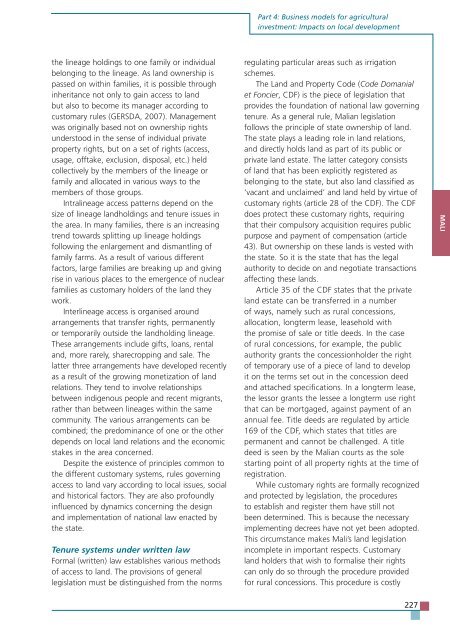TRENDS AND IMPACTS OF FOREIGN INVESTMENT IN DEVELOPING COUNTRY AGRICULTURE
TRENDS AND IMPACTS OF FOREIGN INVESTMENT IN DEVELOPING COUNTRY AGRICULTURE
TRENDS AND IMPACTS OF FOREIGN INVESTMENT IN DEVELOPING COUNTRY AGRICULTURE
Create successful ePaper yourself
Turn your PDF publications into a flip-book with our unique Google optimized e-Paper software.
the lineage holdings to one family or individual<br />
belonging to the lineage. As land ownership is<br />
passed on within families, it is possible through<br />
inheritance not only to gain access to land<br />
but also to become its manager according to<br />
customary rules (GERSDA, 2007). Management<br />
was originally based not on ownership rights<br />
understood in the sense of individual private<br />
property rights, but on a set of rights (access,<br />
usage, offtake, exclusion, disposal, etc.) held<br />
collectively by the members of the lineage or<br />
family and allocated in various ways to the<br />
members of those groups.<br />
Intralineage access patterns depend on the<br />
size of lineage landholdings and tenure issues in<br />
the area. In many families, there is an increasing<br />
trend towards splitting up lineage holdings<br />
following the enlargement and dismantling of<br />
family farms. As a result of various different<br />
factors, large families are breaking up and giving<br />
rise in various places to the emergence of nuclear<br />
families as customary holders of the land they<br />
work.<br />
Interlineage access is organised around<br />
arrangements that transfer rights, permanently<br />
or temporarily outside the landholding lineage.<br />
These arrangements include gifts, loans, rental<br />
and, more rarely, sharecropping and sale. The<br />
latter three arrangements have developed recently<br />
as a result of the growing monetization of land<br />
relations. They tend to involve relationships<br />
between indigenous people and recent migrants,<br />
rather than between lineages within the same<br />
community. The various arrangements can be<br />
combined; the predominance of one or the other<br />
depends on local land relations and the economic<br />
stakes in the area concerned.<br />
Despite the existence of principles common to<br />
the different customary systems, rules governing<br />
access to land vary according to local issues, social<br />
and historical factors. They are also profoundly<br />
influenced by dynamics concerning the design<br />
and implementation of national law enacted by<br />
the state.<br />
Tenure systems under written law<br />
Formal (written) law establishes various methods<br />
of access to land. The provisions of general<br />
legislation must be distinguished from the norms<br />
Part 4: Business models for agricultural<br />
investment: Impacts on local development<br />
regulating particular areas such as irrigation<br />
schemes.<br />
The Land and Property Code (Code Domanial<br />
et Foncier, CDF) is the piece of legislation that<br />
provides the foundation of national law governing<br />
tenure. As a general rule, Malian legislation<br />
follows the principle of state ownership of land.<br />
The state plays a leading role in land relations,<br />
and directly holds land as part of its public or<br />
private land estate. The latter category consists<br />
of land that has been explicitly registered as<br />
belonging to the state, but also land classified as<br />
‘vacant and unclaimed’ and land held by virtue of<br />
customary rights (article 28 of the CDF). The CDF<br />
does protect these customary rights, requiring<br />
that their compulsory acquisition requires public<br />
purpose and payment of compensation (article<br />
43). But ownership on these lands is vested with<br />
the state. So it is the state that has the legal<br />
authority to decide on and negotiate transactions<br />
affecting these lands.<br />
Article 35 of the CDF states that the private<br />
land estate can be transferred in a number<br />
of ways, namely such as rural concessions,<br />
allocation, longterm lease, leasehold with<br />
the promise of sale or title deeds. In the case<br />
of rural concessions, for example, the public<br />
authority grants the concessionholder the right<br />
of temporary use of a piece of land to develop<br />
it on the terms set out in the concession deed<br />
and attached specifications. In a longterm lease,<br />
the lessor grants the lessee a longterm use right<br />
that can be mortgaged, against payment of an<br />
annual fee. Title deeds are regulated by article<br />
169 of the CDF, which states that titles are<br />
permanent and cannot be challenged. A title<br />
deed is seen by the Malian courts as the sole<br />
starting point of all property rights at the time of<br />
registration.<br />
While customary rights are formally recognized<br />
and protected by legislation, the procedures<br />
to establish and register them have still not<br />
been determined. This is because the necessary<br />
implementing decrees have not yet been adopted.<br />
This circumstance makes Mali’s land legislation<br />
incomplete in important respects. Customary<br />
land holders that wish to formalise their rights<br />
can only do so through the procedure provided<br />
for rural concessions. This procedure is costly<br />
227<br />
MALI


